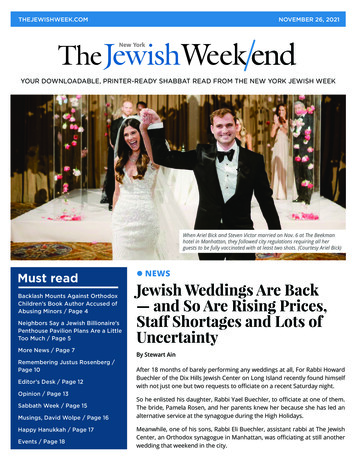
Transcription
THEJEWISHWEEK.COMNOVEMBER 26, 2021endYOUR DOWNLOADABLE, PRINTER-READY SHABBAT READ FROM THE NEW YORK JEWISH WEEKWhen Ariel Bick and Steven Victor married on Nov. 6 at The Beekmanhotel in Manhattan, they followed city regulations requiring all herguests to be fully vaccinated with at least two shots. (Courtesy Ariel Bick)Must readBacklash Mounts Against OrthodoxChildren’s Book Author Accused ofAbusing Minors / Page 4Neighbors Say a Jewish Billionaire’sPenthouse Pavilion Plans Are a LittleToo Much / Page 5More News / Page 7Remembering Justus Rosenberg /Page 10Editor’s Desk / Page 12Opinion / Page 13Sabbath Week / Page 15Musings, David Wolpe / Page 16Happy Hanukkah / Page 17Events / Page 18NEWSJewish Weddings Are Back— and So Are Rising Prices,Staff Shortages and Lots ofUncertaintyBy Stewart AinAfter 18 months of barely performing any weddings at all, For Rabbi HowardBuechler of the Dix Hills Jewish Center on Long Island recently found himselfwith not just one but two requests to officiate on a recent Saturday night.So he enlisted his daughter, Rabbi Yael Buechler, to officiate at one of them.The bride, Pamela Rosen, and her parents knew her because she has led analternative service at the synagogue during the High Holidays.Meanwhile, one of his sons, Rabbi Eli Buechler, assistant rabbi at The JewishCenter, an Orthodox synagogue in Manhattan, was officiating at still anotherwedding that weekend in the city.
THE NEW YORK JEWISH WEEKNOVEMBER 26, 2021d i s p e lt h ed a r k n e s sNovember 29, 2021Times Square @ 43rd Street5:30 - 6:30 PMMUSICAL PERFORMANCES BYDavid Broza, The Maccabeats, and more!M.C.EBONI K. WILLIAMSAttorney, Journalist, and Star of Real Housewives of New YorkPROGRAM HIGHLIGHTSMessages of support from public officialsPublic menorah lightingand so much more!Bring your friends. Bring your family.And, most important, bring your light!HOSTED BYIN COLLABORATION WITHthejewishweek.com2
THE NEW YORK JEWISH WEEK“This is the first time we ever had a Buechler trifecta,”Howard Buechler said.The unusual feat was driven by an explosion of weddingsthis fall as couples schedule the big nuptials that wereunsafe during the height of the pandemic. Along withgrowing guest lists, the trend has put pressure on rabbis,caterers and vendors across the New York City area whoare working their way through a backlog of weddings.No one suggests that the pandemic is over, and the uncertainty — of case surges, new variants and gaps between who is and isn’t vaccinated — brings with it its ownanxiety. (At all three Nov. 13 weddings, Buechler said, hebelieved guests were required to be fully vaccinated.)Still, families have been scrambling to reschedule postponed weddings — and dealing with rising prices, limited venues and ever-changing medical recommendations as they do so.“The number of weddings this year is off the charts,” saidBill Vidro, the owner of Azure Limousine in St. James,New York, in Long Island’s Suffolk County. “People aregetting married this year who rescheduled their weddingfrom last year. There are weddings now from 10 a.m.until 3 or 4 p.m. because the venue was already bookedfor the night. We are picking up brides and grooms asearly as 6:30 in the morning. They go for pictures andthen for an afternoon wedding. It’s insane. And peopleare getting married during the week because weekendsare booked.”The wedding blitz is a microcosm of a global economystill mired in a pandemic, from shifting medical protocols and rising prices to staffing shortages and supplychain disruptions.Ariel Bick, 28, said that when she and her husband Steven Victor married on Nov. 6 at The Beekman hotel inManhattan, they followed city regulations requiring allher guests to be fully vaccinated. Guests were asked toemail their vaccination records to her before the wedding; those who didn’t had to show them at the door.Some 350 guests were invited; 220 attended. “About 10to 15 didn’t come because they were not vaccinated,”she said.One challenge: the rising price of flowers. Flower grow-thejewishweek.comNOVEMBER 26, 2021ers were very conservative when they planted this yearbecause of the losses they sustained last year whenmany events were canceled, explained Jay Riether, anowner of Fleurs du Mois in Manhattan.“That has created a shortage,” he said. “The New Yorkwedding scene is now like what it was pre-pandemic,but flowers are scarce and costs are inflated and themore esoteric flowers are impossible to get. As a result,prices have gone up 20 to 50%.”That was Bick’s experience. “We booked the flowers ayear before the wedding and as we got closer to thedate, they told me that the price was going up and thatthey had to pass along the increase,” she said. “We paidabout 20% more because of what they said was an increase in the cost of labor and materials.”Employers across many industries say they are havinga hard time finding willing workers, a dynamic that isfueled by a number of pandemic-related factors. Thehospitality industry, which includes caterers, has beenhit particularly hard, and Gayle Wilk, an owner of GalaEvent & Food Artistry in Melville, Long Island, said costsare going up also for wait and kitchen staff.“It is very difficult getting help and we are paying thema lot of money,” Wilk said. “We pay a premium for dishwashers – everybody is getting paid more.”Wilk said her staff wears masks and that there are specialprecautions in place because of COVID-19. Frankfurtersin dough “blankets” are usually served with a communalbowl of mustard; instead, Wilk serves the finger foodswith a plastic syringe filled with mustard that guests cansqueeze themselves. (COVID-19 spreads in the air, noton surfaces.)“Guests don’t take anything by themselves, everything isserved to them,” Wilk said.Heather MacLeish, manager of Deborah Miller Catering &Events in Manhattan, said next year promises to be evenbusier “because we will be seeing three year’s worth ofweddings in one year. There will be brunch weddings,two weddings in one day and more Sunday weddingsand weekday weddings. Thursday is going to be a big day.And we are already booking 2023 weddings because a lotof dates next year are filled up and we are seeing peoplewho are already married and want to have a party.”3
THE NEW YORK JEWISH WEEKPeople are anxious to put the pandemic behind themand turn to some semblance of normal, said Wilk.“People are trying to forget about COVID and they areinviting big numbers again,” she said, adding that someinvited guests decline because they don’t want to travelor are “not back mentally.”As a result, she said, parties for 300 end up with 250because 50 “are afraid to come.”But 250 is a bigger crowd than the handful who attendedweddings held during the worst of the pandemic. Marlene Kern Fischer of Armonk, New York, said her son andhis fiancee had planned a wedding for 220 to be held ata hotel in July 2020. The pandemic forced them to cancelthe hotel and the party and Fischer said the couple, EricFischer and Danielle Clemons, held their wedding July 2,2020, in her backyard with just 14 people.“It ended up being so beautiful, so intimate and specialthat now my middle son says he wants a small wedding,”she said. “I feel like the pandemic has given people license to do things differently now. Weddings don’t haveto be in a hall and the couple may not want to sharethe intimate thoughts they were able to express in theirvows before 220 people.”Fischer noted that the bride’s parents drove to her homefrom Maryland and, because they did not want to stay ina hotel, rented an RV that they parked in her driveway.The newlyweds had thought of having a large party afterthe pandemic, but Fischer said the bride decided againstit because “she did not want to insult her beautiful littlewedding by having something else.”The event proved so special, Fischer said, that shewrote a book about it, “Gained a Daughter but Nearly Lost My Mind: How I Planned a Backyard WeddingDuring the Pandemic.”For all the hassle, however, the months of waiting toget married have made the wedding day all the morespecial, according to Rabbi Jack Dermer of Temple BethTorah in Westbury, New York.“There is real gratitude to be able to be together,” hesaid. “I officiated at weddings for couples who postponed their marriages for close to two years. Their marriage now is so much sweeter and holy.”thejewishweek.comNOVEMBER 26, 2021NEWSBacklash MountsAgainst OrthodoxChildren’s BookAuthor Accused ofAbusing Minors,Surprising ManyBy Asaf ShalevIn what some are heralding as a watershed moment inthe Orthodox world, reports of sexual abuse by a prolificauthor of children’s books have now led multiple booksellers to stop making his work available.Meanwhile, advocates and at least one leading rabbiare urging Orthodox parents to remove books by ChaimWalder from their homes. Many are doing so.The Israeli newspaper Haaretz published an investigationlast week alleging that Walder, a therapist as well as awriter, psychologically groomed multiple minors beforeproceeding to abuse them. After the first report, new allegations emerged from additional women who said theyhad been abused by Walder while under his care.Because Walder is wildly popular among haredi Jews,whose children mailed him letters with their secrets,the news triggered a cascade of reactions. Some worried that taboos against airing allegations of abuse outside of Orthodox circles, alongside other longstandingnorms that protect abusers, would mean that Waldercould emerge unscathed.That concern seemed to fade after Eichler’s Judaica inBrooklyn announced on Tuesday that it would suspendsales of Walder’s books, including his “Kids Speak” series, which can be found in many Orthodox homes inthe United States and Israel.“This decision was not made lightly and will no doubtcome at a heavy financial cost, as these books werebestsellers — but as a business that cares about our4
THE NEW YORK JEWISH WEEKcommunity, we cannot ignore the pleas we have received on behalf of the alleged victims,” said the bookstore’s owner, Mordy Getz.Getz also said that while many rabbis expressed theirsupport for his actions only in private, he found it significant that at least one prominent rabbi had gone public,referring to Rabbi Aryeh Klapper, dean of the Center forModern Torah Leadership in Sharon, Massachusetts.In the following days, the Israeli Orthodox newspaperthat published Walder for years suspended his columnand pressed him step back from public life, Haaretz reported. An Israeli supermarket chain catering to haredishoppers announced that it, too, would remove Walder’stitles, and his radio show went off the air. The Sephardicchief rabbi of Tzfat, an Israeli city, decreed that familiesshould not keep Walder’s books in their homes.And on Thursday, Walder’s longtime publisher, Feldheim Publishers of Nanuet, New York, tweeted that itwould remove Walder’s book from shelves while the allegations against the author are being investigated.“We do not judge and sincerely hope he will be able toclear his name,” said the publisher, which has releasedmore than 20 volumes by Walder over three decades.While some criticized the tone of Feldheim’s statementas overly deferential to Walder, the response to its decision, and Getz’s, has focused more on the precedentthey have set. People called the decision an “earthquake,” a “fundamental shift,” “a huge step for the chareidi world” and “a massive change from the denials andcoverups of the past.”“This is an incredible development,” wrote Israeli journalist Anshel Pfeffer. “The Walder case is seminal. Feldheim obviously didn’t want to drop one of their best-selling authors and hope Walder will be rehabilitated, butthe public pressure in the Haredi community was toomuch for them.”Orthodox families in which parents and children alikehave been raised on Walder’s work are also respondingto the revelations.Rahel Bayar, an Orthodox former sex abuse prosecutor who now runs a consultancy aimed at helping organizations including synagogues and camps prevent sexthejewishweek.comNOVEMBER 26, 2021abuse, wrote on her social media accounts Thursday thatshe had gotten “so many” questions from parents aboutwhat to do in their own homes. She urged them to discard the books — and to explain to their children why.“Enabling a predator takes many forms and in this case,continuing to engage in the content of an alleged pedophile — content directed at children, no less — enables his normalization. So, we don’t,” Bayar wrote. Sheadded, “Your children must know that if something everunsafe happens to them, they will be believed.”On Instagram, a center for activism by Orthodox women, many mothers posted pictures of the books thatthey said they were throwing away. Without namingWalder, Shoshana Greenwald, for example, wrote, “Asyou can see from the missing cover, this book has beenread many many times. No more.”NEWSNeighbors Say aJewish Billionaire’sPenthouse PavilionPlans Are a Little TooMuch — Even forManhattanBy Ben SalesNeighbors are objecting to the two-story glass pavilionthat hedge fund manager Bill Ackman and his wife, theIsraeli-born architect and designer Neri Oxman, want tobuild on the roof of their apartment building on Manhattan’s West 77th Street.The dispute has pulled in some high-powered neighborsand advocates on both sides, including legendary PBSjournalist Bill Moyers (he’s against) and a small “Who’sWho” of prominent Jewish New Yorkers, according toThe New York Times.5
THE NEW YORK JEWISH WEEKNOVEMBER 26, 2021GET THELatkepalooza!Cookbook8 SCRUMPTIOUS RECIPESFOR 8 FESTIVE NIGHTSDOWNLOAD NOWat www.ujafedny.org/latkepaloozaBROUGHTTO YOU BYthejewishweek.com6
THE NEW YORK JEWISH WEEKColumnist Gina Bellafante reports that the dispute isn’tabout historic architecture, sunlight or other similarflashpoints in New York city zoning disputes. It’s actually about what, if anything, the city will do to limit theincreasing power of its billionaire class. A three-hour debate over the proposal in the Landmarks PreservationCommission, Bellafante wrote, was “about where theretaining wall ought to be erected against the desiresof the magnificently wealthy to configure the world precisely to their specifications.”Ackman made a giant windfall in March 2020 by bettingthat COVID would crash the economy. The Haifa-bornOxman, who teaches at MIT, has drawn wide praise forher pioneering work fusing principles of nature and sustainability into her designs. The couple — who were introduced by Marty Peretz, the former publisher of TheNew Republic and co-founder of TheStreet.com — weremarried at Central Synagogue in January 2019. Ackmanhas donated large sums to a range of Jewish causes,from the Center for Jewish History to Birthright.Among their supporters at the Landmarks PreservationCommittee meeting were many prominent Jews, including architecture critic Paul Goldberger; Louise Mirrer,the president of the New-York Historical Society andexpert on medieval Spanish Jewry; and Betsy Gotbaum,the Historical Society’s former president and the NewYork City Public Advocate from 2002 through 2009. Theformer owner of the property was media executive Norman Pearlstine.The dispute is playing out against the media’s and public’s obsession with billionaires and their spending — including, but not limited to, the HBO series “Succession,”recent self-funded trips to outer space by Jeff Bezos andRichard Branson, and Congressional debates over increasing taxes on the very rich. Manhattan, where newluxury “supertall” apartment buildings are changing thelandscape, is at the center of the discussion.As Bellafante reports it, the city’s landmarks commissionasked Ackman and his architect, the British “starchitect”Norman Foster, to submit a new plan for the rooftoppavilion with a smaller second story.thejewishweek.comNOVEMBER 26, 2021NEWSAlex Edelman’sNew Comedy ShowRaises ContentiousQuestions AboutJewish Identity. HeSays That’s the Point.By Ben SalesIf you click through Twitter, you may come upon a listof some 250 accounts called “Jewish Nat’l Fund Donors.”But it’s safe to say that no one on the list has ever givenany money to the actual Jewish National Fund, an organization best known for acquiring land and plantingtrees in Israel.That’s because the list is made up exclusively of antisemites and was created by Alex Edelman, a Jewish comedian. He chose that name, he said, “just because it annoyspeople when they’re added to the list.”“It’s actually a pretty diverse group of people,” Edelman,32, told the New York Jewish Week. “The sad thing is thislist used to be several hundred people longer, but Twitterhas actually done a good job for the last couple years.”Edelman, a comedian who has appeared on late-nightTV and recently opened for the musician Beck, is also anamateur tracker of online antisemites in his spare time.That hobby led him to attend a meeting of white nationalists in New York City in 2017 — a story that forms thecore of his latest solo show, “Just For Us,” which opensoff-Broadway on Dec. 8. But even as the show tells thestory of that meeting, Edelman emphasized that “JustFor Us” isn’t about antisemitism — it’s about what it’slike for Ashkenazi Jews to navigate whiteness in America.“Broadly, it’s about, What does it mean to be a Jew ina space that’s not Jewish?” he said. He added later,“Everyone focuses on the white identity people at the7
THE NEW YORK JEWISH WEEKcenter of the meeting, these racists. Maybe this is revealing, but the show’s about me. They [the white nationalists] are entirely secondary to me talking abouthow I feel about myself.”Negotiating the boundary between Jews and non-Jewshas always been an undercurrent of life for Edelman, aModern Orthodox Jew who attended Jewish day schoolin the Boston area and studied for a year in an Israeli yeshiva. Appearing on the late-night show “Conan” in 2018,Edelman told the crowd, “I’ve never had bacon. I’m thatkind of Jew I’ve tried cocaine but I’ve never tried bacon.”(“Jews either love that joke, or they’re upset by it,” hetold me. On a video of the performance, you can hearan Israeli in the crowd yell “Good for you!” in Hebrew.)Edelman has managed to make food a recurring themein his exploration of what it means to be Jewish in acountry and world that is overwhelmingly not. We metat Sable’s, a classic New York City deli on the Upper EastSide that probably qualifies as one of the most Jewishplaces ever (cf. the “Jewish rye bread” sold at the counterand a menu heavy on both smoked fish and pastrami).But Edelman said that he tries to visit delis in every placehe performs, whether it’s Denver, L.A. or Indianapolis.“You can find a deli almost in any city,” he said. “I’m a bitof a snob. But when you’re on the road, you take whatyou can get, and they’ve got Dr. Brown’s cream soda anda decent tuna sandwich, and I’m all for it.”The relative ubiquity of good smoked fish isn’t the onlyreason Edelman is happy to be back in New York. He’sexcited to perform “Just For Us,” which premiered at theMelbourne International Comedy Festival in 2018 andlater, he said, “took a nap” for the pandemic. This is itsU.S. premiere.Tellingly, he feels that the show is just as relevant afterthree years in which the experience of antisemitism haschanged significantly — from the Pittsburgh synagogueshooting to the antisemitic rhetoric that accompaniedthe 2020 election to, most recently, antisemitic tropes indebates over COVID vaccines.“At the core of this show is the conversation about Judaism and, in particular, my Judaism and its relation towhiteness. That is a huge part of the show, and that hasnot changed,” he said. “I gotta be honest with you, I don’tthejewishweek.comNOVEMBER 26, 2021think antisemitism is ever going out of style.”Edelman is also excited to perform the show in frontof an audience that will presumably have a substantialnumber of Jews, which is a rarity for him. He got his bigbreak in 2014, when he was named Best Newcomerat the Edinburgh Comedy Awards, and has done a fairamount of work since then in the U.K., which has seenan ongoing antisemitism controversy plague its politicalsystem for the past several years. He’s also performedthe show in Berlin, which was weird, he said, “only because they don’t speak a ton of English.”In 2019, Edelman made a four-minute documentaryabout antisemitism for the BBC, in which he manages tocover an impressive amount of ground — from summarizing historical tropes about international Jewish conspiracies to describing the discomfort Jews often feelwhen they’re buttonholed by people asking their opinion on Israeli policies.“Is it frustrating to have to do a documentary for the BBCwhere you explain that Jews are people?” he said. “I havelots of patient conversations with people about Jews andJudaism because I am, to some people, the most Jewishperson they’ve ever met I don’t view it as part of my jobbut I do view it as part of my personhood.”That tone — patient and thoughtful — is how Edelmancomes off in person. On stage he can be more bombastic and intense. Edelman’s “most resonant joke,” he said,is about how hard it is for people of his generation tobuy a house.“How is any young person ever gonna own a home?” hesays in an exasperated tone, almost yelling to the audience. “It’s made me hate old people. I see a few of youin here tonight. I hate you! Because every old person they’re like, ‘My house is worth 2 million, but when Ibought it in 1981, I paid 11 raspberries for it!’”Edelman’s previous work touches on his Judaism, including his first two comedy specials: “Millennial,”about his generation and “Everything Handed to You,”about his family. “Just For Us” obviously addresses Jewish identity directly. Although he began performing itbefore the pandemic, the off-Broadway run comes after a year and a half in which Edelman says his Jewishobservance has changed.8
THE NEW YORK JEWISH WEEKAt the beginning of the pandemic, Edelman was thehead writer of “Saturday Night Seder,” a virtual Passover seder and variety show hosted by Jason Alexanderand attended by other Jewish celebrities and those whoplay Jews onscreen, such as Rachel Brosnahan. It raisedmore than 3.5 million for charity. Later last year, Edelman helped out rabbis who hoped to make virtual HighHoliday services more engaging during the pandemic.He’s also started having a regular hevruta, or two-person Jewish study session, about the weekly Torah portion with Sarah Hurwitz, a former speechwriter for Michelle Obama who went on to write “Here All Along,” abook about exploring Judaism. Speaking with me, hereferenced the Talmud as a work of “pragmatic idealism” and also name-dropped Rabbi Joseph Soloveitchik,a leading 20th-century Modern Orthodox thinker.Edelman said “Saturday Night Seder” is part of what ledhim to become more observant during the pandemic.“I found a community of Jews that I didn’t know existed,which were traditional Jews who were focused in a creative way and felt like my people, who weren’t looking toreinvent or hack Judaism, but just had an interest in it,but also can exist keenly in the secular world,” he said.And after “Just For Us” is done — the show runs throughDec. 19 at the Cherry Lane Theatre — Edelman doesn’tplan to stop talking about Judaism. He’s even considering making his next special about another fraught topic:Israel. He said his manager used to joke, “We can call theshow ‘Career Suicide.’”But Edelman doesn’t mind the contentious questionsthat ensue when he’s talking about Judaism to non-Jews.That kind of conversation, he said, is the best part.“My favorite thing to do is argue and discuss and havediscourse,” he said. “When people ask me what my favorite thing about Judaism is I always say it’s discourse.It’s not a fun answer. People want bagels. People wantme to say it’s bagels, but it’s not.”For advertising opportunities, contactadvertise@jta.orgthejewishweek.comNOVEMBER 26, 2021NEWSThis Catchy ‘WestSide Story’ HanukkahParody Was Filmed onLocation in New YorkBy Lisa KeysThe opening shot is a panorama of the George Washington Bridge, its tower and the surrounding buildingstransformed into a flickering menorah with all nine of itscandles lit. “A West Side Chanukah Story,” the openingtext announces — and immediately, the very New Yorksounds of traffic and car horns give way to a familiarsequence of snaps and the wordless singing of a wellknown tune.So begins the latest Hanukkah parody video from theNew York-based Jewish a cappella group Six13. The video is a voices-only compilation of and riff off some ofthe greatest hits from Leonard Bernstein and StephenSondheim’s iconic 1957 Broadway musical, “West SideStory,” including “Maria” (reimagined here as “Menorah”) and “Tonight” (which becomes “Eight Nights”).While Hanukkah a cappella parody videos have becomesomething of an annual tradition in recent years, a major inspiration for this particular video is the forthcoming reboot of the 1961 film version of “West Side Story.”Directed and co-produced by Steven Spielberg, with anupdated screenplay by Tony Kushner, the new film isset to hit theaters on Dec. 10. “When I heard that wascoming out, I was like, when?” original Six13 memberand chief arranger Mike Boxer tells the New York JewishWeek. “We are doing this, for sure.”“West Side Story,” Boxer added, “is one of the greatestpieces of art ever crafted.”Six13’s Hanukkah-inspired musical medley, filmed on location in Manhattan, is chockablock with clever Festivalof Lights puns and imagery. For example, in “On Chanukah” — a version of the “West Side Story” showstopper“America” — the lyrics include: “Chocolate money on Ha-9
THE NEW YORK JEWISH WEEKnukkah/Latkes are crunchy on Hanukkah/Presents fromBubbe on Hanukkah/I want a puppy for Hanukkah!”(This last lyric is notably a reference to David Digg’s 2020instant classic, “Puppy for Hanukkah.)It’s truly a delightful watch from this well-seasonedgroup, which first formed 18 years ago as an outgrowthof a co-ed Jewish a cappella group at Binghamton University. After college, Boxer and a few buddies missedthe camaraderie of the group, he said. And so theyformed Six13; essentially “just guys who like to sing,” ashe described it.“Over the years, the guys would get a promotion at work,or would do things like get into med school, or have athird or fourth kid, and their time [with the group] wouldexpire,” Boxer said. “The silver lining was, every time welost someone, we gained someone who was even better.”These days, Six13 consists of eight members, most ofwhom range in age from 26 to 32, according to Boxer,who, at 41, is the elder of the group. “I’m the guy whojust won’t leave,” he quipped. It members live acrossthe city, as well as in Long Island and New Jersey, whichmade Manhattan the ideal location for a video — notonly is it essential to the spirit of “West Side Story” but itwas convenient for everyone, too.The video’s intro, for example, features six members ofthe group snapping their fingers and leaning against achain-link fence. Boxer stumbled across the location —which is a fence that surrounds the playground at P.S.452 on West 61st Street — as he was dropping off hiskids at Abraham Joshua Heschel School. “Perfect!” Boxerrecalled thinking. “We’re just going to stand right there.”NOVEMBER 26, 2021regardless of their musical abilities, do all the time.“That’s something everyone around the world is going tobe doing on Sunday night,” he said, “singing a cappellaaround their menorahs.”REMEMBERINGJustus Rosenberg,Professor andLast SurvivingMember of GroupThat SmuggledIntellectuals Out ofNazi-Held Europe,Has Died at 100By Shira HanauJustus Rosenberg, a professor whose long career teaching literature was preceded by a remarkable tenurein the French resistance during World War II, died lastmonth at the age of 100.Other locations include Morningside Park, the social hallat the Stephen Wise Free Synagogue, the SAR Academyin Riverdale, and the offices of the Manhattan Jewish Experience, an organization that encourages young Jewishprofessionals to explore Jewish life and meet one another, which sponsored the video.Rosenberg was a professor at Bard College in Annandale-on-Hudson, New York for decades where he taughtliterature and languages, including German, French, Yiddish, Russian and his native language, Polish. It wasn’t until he was in his mid-70s that he began to speak about hisexperiences during the Holocaust, when, as a Polish-Jewish refugee in Paris, he worked as a courier for a rescueeffort led by the American journalist Varian Fry to saveintellectuals, writers and artists stuck under Nazi rule.Six13 has consistently put out a stream of high-quality Jewish holiday parody videos — including a super-catchy sea shanty from Passover 2021, as well as“Bohemian Chanukah,” a version of the Queen epic“Bohemian Rhapsody.”Even Rosenberg’s wife Karin, who he first met in the1980s, was unaware of her husband’s heroic past until1998. “I believe he was a hero. But he did not think ofhimself as a hero. To him, he was just doing what needed to be done,” Karin told The New York Times.Singing a cappella, Boxer points out, is something Jews,Rosenberg was born in Danzig, Poland in 1921 to a well-thejewishweek.com10
THE NEW YORK JEWISH WEEKoff Jewish family that was not particularly religious. After being forced out of school as a teenager due to newlaws barring Jews from the schools, his parents sent himto Paris to continue his studies. When the Nazis invadedPoland in 1939, Rosenberg lost all contact with his parents and sister, who he would only learn had survivedafter the war ended. He was finally reunited with themin 1952 when they made their way to Israel.When the Nazis took over Paris, Rosenberg fled to Toulouse where he met a woman who recruited him to joinVarian Fry’s Emergency Rescue Committee-sponsoredrescue effort in Marseille. Rosenberg, who was blonde,appeared younger than his age and spoke French,worked as a courier for Fry, ferrying forged documen
for the night. We are picking up brides and grooms as early as 6:30 in the morning. They go for pictures and then for an afternoon wedding. It’s insane. And people are getting married during the week because weekends are booked.” The wedding blitz is a microcosm of a global econom










